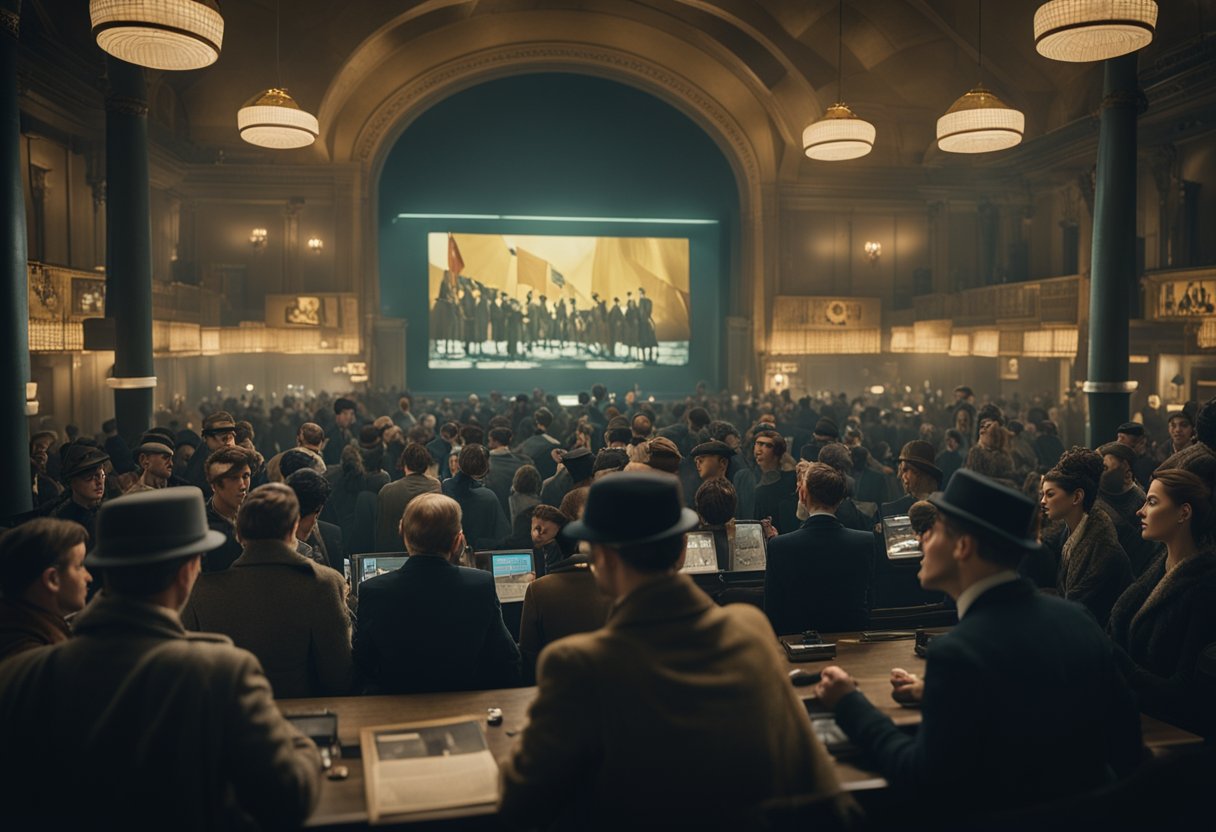Babylon Berlin, a series that transports viewers to the Weimar Republic era, has made a significant mark on German television. It is not just any German TV show but holds the distinction of being the most expensive drama series produced in the country.
Its gripping narrative that weaves through the political and social tapestry of 1920s Berlin has resonated with a wide German audience. The show’s success is not limited to its home country; it has been broadcast in over 100 countries, highlighting its international appeal.
The show has impressed viewers with its careful attention to historical detail, high production values, and complex character development.
The depiction of Weimar Republic-era Berlin offers a window into a period of extreme contrasts—where creativity and decadence met the rise of dark ideologies. Its popularity was cemented when it launched with strong viewing numbers on free-TV in Germany, becoming the most popular scripted series of the year.
While there is a resurgence of interest in this period of history, Babylon Berlin’s popularity could be attributed to how it deftly combines entertainment with a reflection upon the anxieties of contemporary times.
It holds a mirror to the societal issues and cultural shifts of the 1920s that seem to echo in today’s world, making the series a relevant watch for its audience. Considered a triumph of German television, the show’s reception among German viewers further solidifies its status as a cultural phenomenon.
Historical Background and Setting
Babylon Berlin vividly portrays the tumultuous atmosphere of the Weimar Republic, drawing audiences into the complex political and social climate of 1920s Berlin.
Weimar Republic and Political Landscape
The Weimar Republic was Germany’s government from 1919 to 1933, a period marked by significant political instability. Berlin during this time was a hotspot for political activities, with numerous parties vying for power in a fledgling democracy.
The late 1920s, particularly 1929, were defining years that saw increased political unrest; the Nazi Party along with other far-right groups clashed frequently with Communists, Trotskyists, and Stalinists. Amidst this turmoil, the figure of Adolf Hitler emerged as a significant leader, with his National Socialist German Workers’ Party (NSDAP) gaining traction. The presence of the SA, or “Brownshirts,” underscored the growing tension.
Post-WWI Socioeconomic Climate
After World War I, Germany’s economy was left in shambles, leading to widespread poverty, unemployment, and hyperinflation. Within Berlin, these economic struggles were palpable, with many of the city’s inhabitants grappling with the repercussions of the war and subsequent Versailles Treaty.
This socioeconomic climate served as a fertile ground for political discontent and was a contributing factor to the eventual decline of the Weimar Republic and the rise of extremist political forces.
Babylon Berlin Overview
“Babylon Berlin” stands as a prime example of German television’s prowess, intricately weaving historical intricacies with compelling storytelling.
Series Synopsis and Genesis
“Babylon Berlin” is inspired by the novels of Volker Kutscher, following the story of Inspektor Gereon Rath, portrayed by Volker Bruch, a police inspector transferred to Berlin.
The series plunges into the vibrant and dark sides of 1929 Berlin, detailing the political and social turmoil of the time. Rath teams up with Charlotte Ritter, played by Liv Lisa Fries, an aspiring police inspector, to navigate a complex web of crime and corruption.
Creators and Production
The show is a brainchild of directors Henk Handloegten, Tom Tykwer, and Achim von Borries, who also serve as its writers. The production is a combined effort of X Filme Creative Pool, ARD Degeto, and Beta Film, with a staggering budget of around €40 million. “Babylon Berlin” is seen as a trendsetting production for its high production value and intricate storytelling.
Cast and Characters
Alongside Bruch and Fries, the series features a diverse cast bringing Berlin of the late 1920s to life. Characters like Bryan Ferry and Bruno Wolter contribute to the show’s complex narrative. Each character in “Babylon Berlin” is carefully constructed to reflect the troubled times they inhabit, contributing to the show’s gripping atmosphere.
Cultural Impact
Babylon Berlin’s unique blend of history and entertainment has significantly influenced both German and international cultural landscapes.
Reception in Germany and Worldwide
Babylon Berlin, the most costly drama in German television history, mesmerized German audiences with its vivid reenactment of the Weimar Republic’s complexities.
The show’s reach extended far beyond Germany, winning acclaim across various streaming platforms such as Netflix and HBO Europe, and marked a significant moment for German-produced television being recognized on a global stage.
Influence on German and International Media
The success of Babylon Berlin has underscored the potential of German television to compete on the international market. Its compelling storytelling and high production values set a precedent that has put German series on the radar of audiences worldwide, influencing how German media is perceived and distributed.
The show’s resonance with audiences extends from the gritty depiction of Berlin’s historical metropolis life to the colorful and dark undercurrents of cabaret culture, showcasing a cultural period that still fascinates today.
Historical Accuracy and Educational Value
While entertaining, Babylon Berlin does not neglect its commitment to historical accuracy, meticulously recreating the atmosphere of 1920s Berlin. Its detailed portrayal of the era’s political and social turmoil engages both culture enthusiasts and students, becoming a valuable educational resource for understanding a pivotal moment in history.
Although some dramatic liberties are taken, the series stays true to the essence of the time, offering viewers insight into the Weimar Republic — a subject that continues to be studied and discussed for its relevance to contemporary society.
Themes and Aesthetics
“Babylon Berlin” captures the tumultuous atmosphere of 1920s Berlin with a blend of historical authenticity and engaging storytelling. The series’ themes and aesthetics offer a complex picture of the era, combining the glitz of Berlin’s nightlife with its socio-political undercurrents.
Representation of Berlin’s Golden Age
The series meticulously depicts the Golden Age of Berlin, portraying it as a thriving metropolis and cultural hub. The characters navigate a world of vibrant cabaret performances, groundbreaking art, and modernity.
Concurrently, the narrative does not shy away from the stark contrasts of the time, showcasing both the allure and the inequity inherent within the city, from glittering nightlife to palpable poverty.
Underlying Themes
Babylon Berlin is rich with underlying themes such as sex, corruption, and politics, which intertwine with the personal lives of its characters. The series reflects the era’s political unrest and the rise of extremist ideologies.
There is a constant sense of danger and thriller elements as characters confront the realities of the Berlin mafia, extortion schemes, and daily operations at the police headquarters. “Babylon Berlin” is a drama series that delves into how these complex themes affect the lives of Berliners during a contentious historical period.
Art Direction and Filmmaking Techniques
The art direction and filmmaking techniques of “Babylon Berlin” are crucial to its success as a period drama. Authentic costumes and elaborate set designs recreate the aesthetics of 1920s Germany, from the Goldstein’s decadence to the back alleys stricken with destitution.
Cinematography and visual effects bring the instability of the Weimar Republic to life, immersing viewers in the production‘s commitment to historical accuracy and narrative suspense.
Viewer Engagement and Fandom
“Babylon Berlin” has garnered a significant fan base, reflecting its popularity among German audiences. The show’s success has translated into active engagement and the expansion of its universe through various media.
Fan Base and Community
German viewers have extensively engaged with “Babylon Berlin”, showcasing a dedicated following. Online platforms have seen fans convening to discuss intricate plot details, characters, and historical accuracy.
Viewers express their enthusiasm by participating in social media discussions and fan-run forums. This collective engagement underlines a significant aspect of the series’ popularity in Germany.
Merchandising and Related Media
The interest in “Babylon Berlin” extends beyond the screen with a notable presence in merchandising, which has tapped into the enthusiasm of its audience. Fans can purchase a variety of themed products, from clothing bearing iconic imageries of the show to replica props that highlight its 1920s setting.
Moreover, the adaptation of the novels by Volker Kutscher into the television series has also encouraged the proliferation of related literature, indicating an eagerness to explore the “Babylon Berlin” universe in different formats.
Availability and Distribution
Babylon Berlin, Germany’s opulent export, has found a substantial audience both domestically and internationally, aided by robust distribution networks and strategic marketing.
Access in Germany and Internationally
In Germany, Babylon Berlin was initially available on Sky 1, making its debut on October 13, 2017, with a substantial release that quickly piqued interest.
The show, apart from its home country availability, has made significant inroads on the global stage, due in no small part to Netflix acquiring the rights for streaming outside of Germany. This arrangement dramatically expanded the audience, with Netflix offering the first two seasons to an international viewership hungry for interwar period drama.
Babylon Berlin’s presence is equally notable across Europe, with HBO Europe handling distribution in selected European countries, bringing the decadent portrayal of 1920s Berlin to an even broader audience.
Furthermore, distribution agreements with public broadcasters like ARD Degeto have permitted the show to reach viewers preferring traditional television viewing in Germany.
Marketing and Promotional Strategies
The distribution success of Babylon Berlin has been bolstered by dynamic marketing and promotional strategies. The show, celebrated as one of the most expensive German television series to be produced, leverages its lavish production value as a core selling point in its promotional materials.
Intriguing trailers, striking posters, and consistent social media engagement have been critical in capturing the attention of potential viewers both in Germany and abroad.
In the U.S., where the appetite for foreign drama series has been steadily growing, the series has been marketed as a must-see for fans of historical fiction and crime drama. Through strategic partnerships and the strong market presence of platforms like Netflix, Babylon Berlin has managed to reach audiences far beyond its anticipated scope, maintaining a robust and dedicated fanbase.
Economic Impact
“Babylon Berlin” has demonstrated significant economic ramifications in both the domestic and international markets. The series’ substantial budget and the revenue it has generated underscore its role in bolstering Germany’s profile within the global entertainment industry.
Budget and Revenue
“Babylon Berlin,” heralded as television’s most lavish German production, was commissioned with a staggering budget reported to be approximately €40 million. This financial investment underscores the series’ production value and the commitment to authentically depicting the Weimar Republic era.
The distribution of “Babylon Berlin” has not only recouped this investment but also generated significant revenue through international sales, streaming rights, and syndication.
Impact on Local and Global Markets
The production of “Babylon Berlin” bolstered the local economy by creating jobs and utilising local resources. The series’ success also accelerated the global market’s interest in German productions, leading to increased demand for similar content.
This effect expanded distribution opportunities for German media, thereby enhancing the nation’s influence in the global entertainment economy.
Future Prospects
Babylon Berlin has solidified itself as a noteworthy German television drama with international acclaim. Its success in Germany hints at an atmosphere ripe for continued storytelling within this series.
Potential for New Seasons
The first two seasons of Babylon Berlin have set a high precedent for quality and intrigue. With the series being the most expensive German TV series to date, the potential for new seasons seems promising, especially given its reception. The drama series has captured the intricacies of 1920s Berlin, and the creators have ample historical events to explore, should they decide to extend the series’ timeline.
Long-term Cultural Relevance
German television has seen a gem in Babylon Berlin, which not only entertains but also educates viewers on Weimar Republic-era Berlin. Its long-term cultural relevance hinges on its historical authenticity blended with engaging narratives. As it already spawned international interest in the fashions of 1920s Berlin, the series may continue to influence pop culture and historical interest for years to come.
Ethical and Social Issues
“Babylon Berlin,” acclaimed for its cinematic portrayal of 1920s Germany, addresses the intricate social and ethical climate of the era, examining the interplay between culture and politics amidst growing political unrest.
Depiction of Sensitive Historical Topics
The series does not shy away from presenting the volatile political landscape of the Weimar Republic, characterized by the rise of the Nazi Party and the threat of communism.
By dramatizing historical events leading up to the ascent of Adolf Hitler, “Babylon Berlin” scrutinizes the ethical implications of glorifying or oversimplifying such a complex time. It captures moments of political strife that precipitate the era’s descent into authoritarianism.
Representation of Marginalized Groups
Economic disparities and societal hierarchies are foregrounded in the series, offering a critique on the poverty and struggle faced by the marginalized.
The portrayal of groups who suffered under the widening social rifts, especially during the burgeoning power of the NSDAP (Nazi Party), allows viewers to reflect on the ethical considerations of period representations. These groups’ narratives underscore how historical dramas can influence contemporary perceptions of past injustices.
Technical Aspects
Babylon Berlin’s acclaim is not only due to its gripping narrative but also its impressive technical execution, which includes high production values. The series showcases meticulous attention to detail in both visual and auditory aspects, contributing significantly to its popularity in Germany.
Cinematography and Visual Effects
The cinematography of Babylon Berlin is a visual spectacle that pays homage to the aesthetics of the Weimar Republic era. The production team leverages sophisticated camera techniques and high-quality visual effects to recreate 1920s Berlin with authenticity.
Scenes are composed with dynamic lighting and shadows, simulating the texture of the time. Moreover, the use of CGI complements physical sets, seamlessly integrating historic landmarks into the urban tapestry of the show.
Sound Design and Musical Score
Babylon Berlin’s sound design is as intricately crafted as its visual counterpart. Each auditory element is chosen to enhance the viewer’s immersion into the narrative. The soundscapes are rich and period-accurate, from the clatter of typewriters to the bustling noise of city life.
The musical score, including contributions from Bryan Ferry, interweaves contemporary tunes with period-themed compositions, thereby creating a unique and captivating audio experience that resonates with audiences and accentuates the show’s popularity in Germany.
Character Insight
In “Babylon Berlin,” a series celebrated for its intricate character arcs, the detailed protagonist and antagonist dynamics, along with the engaging development of relationships, form the cornerstone of its storytelling success.
Protagonist and Antagonist Dynamics
Inspector Gereon Rath, portrayed by Volker Bruch, is a complex protagonist whose personal battle with demons from his past adds depth to the series. His character consistently grows throughout the show, offering a genuine look at the psychological impact of post-war Germany.
Rath’s interactions with other characters, particularly his complex relationship with Bruno Wolter, his partner and at times an antagonist, underscore a tense yet compelling narrative that reveals the murky lines between right and wrong.
Character Development and Relationships
On the other hand, character development is not solely limited to Gereon Rath. Charlotte Ritter, a driven police assistant aspiring to be a detective, provides a strong narrative of social struggles and ambition in a male-dominated world.
Her relationship with Rath slowly evolves from professional to personal, adding another layer of intricacy to their characters. Charlotte’s determination juxtaposed with Rath’s internal conflicts creates a rich tapestry of character interactions that are pivotal to the show’s popularity in Germany.
Comparative Analysis
Babylon Berlin’s popularity in Germany can be assessed by examining its performance relative to other TV series and its significance within the annals of German television.
Comparison with Similar TV Series
When considering Babylon Berlin against contemporaneous TV series, one observes that it stands out as a significant production. Its high budget and success are noteworthy, especially in contrast to other German TV dramas.
The show’s international appeal, drawing on the era’s associations with film noir and the musical, has helped it to resonate beyond the German audience, as highlighted in an analysis by the European Journal.
- Budget and Production Value: Babylon Berlin is often cited as the most expensive German television drama ever made. Its production quality and value rival those of mainstream international series.
- Viewership: In terms of viewership, Babylon Berlin has reached a wide audience, both domestically and internationally, but specific numbers that detail its popularity in Germany compared to similar series need to be considered for a direct comparison.
Babylon Berlin’s Place in German TV History
Babylon Berlin has carved a unique place for itself in German television history. The series not only captures an essential period of German history but also reflects current societal and cultural anxieties, as discussed in The Conversation. It interweaves historical authenticity with a modern storytelling approach, which may explain its wide appeal.
- Historical Portrayal: It has been praised for its authentic depiction of the Weimar Republic era, an aspect that garners academic interest and critical acclaim.
- Cultural Impact: The series has achieved a notable cultural impact in portraying a volatile yet vibrant period in German history, resonating with audience fascinations and anxieties about social and technological changes.
By these measures, Babylon Berlin does not only entertain but also enriches the cultural landscape of German television.
Frequently Asked Questions
This section answers common queries regarding the cast, creation, release schedules, historical accuracy, budget, and reception of Babylon Berlin.
Which actors are part of the Babylon Berlin Season 4 cast?
The Season 4 cast of Babylon Berlin includes Volker Bruch as Inspector Gereon Rath and Liv Lisa Fries as Charlotte Ritter, among others. The series is known for its ensemble cast that brings Weimar Germany to life.
Who is the writer behind Babylon Berlin?
Babylon Berlin was co-created by Tom Tykwer, Achim von Borries, and Hendrik Handloegten. The trio are also credited as the main writers of the show.
When is the release date for Babylon Berlin Season 5?
As of now, there is no publicly confirmed release date for Season 5 of Babylon Berlin.
How does Babylon Berlin fare in terms of historical accuracy?
Babylon Berlin has been recognized for its meticulous depiction of 1920s and 1930s Germany, although some artistic licenses have been taken for narrative purposes.
What is the budget of Babylon Berlin, and is it among the most expensive German TV shows?
Yes, Babylon Berlin is reported to be the most expensive German TV series to date, reflecting its high production values and detailed period settings.
Is Babylon Berlin worth watching based on viewer and critic reviews?
Both critics and viewers have praised Babylon Berlin for its complex characters, gripping plotlines, and high production quality, suggesting the show is well-received and worth watching.





